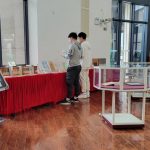 UM holds the Exhibition of Master Hsing Yun’s Works
UM holds the Exhibition of Master Hsing Yun’s Works
In tribute to the memory of Master Hsing Yun, honorary doctor of the University of Macau (UM) and founder of the Fo Guang Shan Buddhist order in Taiwan, the UM Library has launched the Exhibition of Master Hsing Yun’s Works, which will take place in the library lobby from 8 February to 8 March. About 50 books written by Master Hsing Yun, including autographed copies, and related videos will be on display at the exhibition.
Master Hsing Yun was a long-time supporter of the development of UM. In 2011, he gave a lecture at the university to encourage everybody to obtain happiness from doing the right thing. The lecture benefited UM students tremendously. In 2013, UM conferred an honorary doctorate in humanities on him in recognition of his outstanding contributions to cultural affairs and education. His contribution to the enhancement of UM’s academic standards and influence will be long remembered by the university.
The items on display include the Complete Works of Venerable Master Hsing Yun, Humanistic Buddhism: Holding True to the Original Intents of Buddha (English edition), Humanistic Buddhism: Journal, Arts, and Culture, and Humanistic Buddhism’s 100 Paths to Happiness. The Complete Works of Venerable Master Hsing Yun is a book collection of 365 volumes, symbolising the 365 days in a year and the perfection of the existence of all beings in the world. The collection is a comprehensive account of the master’s early writings, his later teachings and lectures, as well as his advice on the development of Buddhism and vision for the country. It is also a valuable record of the history and development of the philosophy of Humanistic Buddhism. For more details about the exhibition, please call 8822 8170 or email to lib_ref@um.edu.mo.


